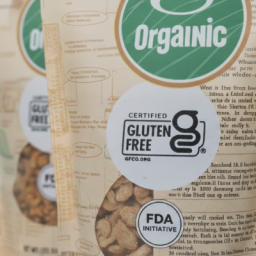
The following is a summary of relevant, notable Class Action Lawsuits that were filed during April 2025. Below is a summary of the plaintiff’s allegations. To request a copy of a particular complaint or for queries or further discussion, you’re welcome to reach out via email at [email protected].
1. “No Artificial Preservatives” Oatmeal Label Allegedly Misleads Consumers
Plaintiffs: Cristina Andrulis
Defendants: Walmart Inc.
Product Focus: Great Value Strawberries & Cream Instant Oatmeal
Summary:
This class action lawsuit accuses Walmart of misbranding its Great Value Strawberries & Cream Instant Oatmeal as having “No Artificial Preservatives,” while the ingredient list includes citric acid, a substance the plaintiff argues is synthetic and performs preservative functions.
Plaintiff claims citric acid is chemically manufactured through a multi-step industrial process using genetically modified black mold and is widely recognized in food science as an acidulant, antioxidant, antimicrobial agent, and chelating agent. Its use in dried fruit pieces within the oatmeal allegedly helps prevent spoilage, extend shelf life, and maintain color and taste, thereby functioning as an artificial preservative.
The complaint argues this renders the product misbranded under New York’s Agriculture and Markets Law (AGM § 201) and that Walmart fails to adequately disclose the function of citric acid on the label, while prominently displaying a “No Artificial Preservatives” claim on the front of the package. Andrulis alleges she and other consumers paid a price premium based on this misleading labeling and would not have done so had they known the product contained synthetic preservative agents.
Relief Sought: Class certification, restitution, actual damages (but not statutory penalties), and corrective advertising. The complaint also demands a jury trial and seeks to quantify economic harm through pricing analysis methodologies such as conjoint and hedonic pricing models.
2. “Wild Alaskan Salmon Oil” Allegedly Not Made with Wild Alaskan Salmon
Plaintiffs: Ralph Barb
Defendants: The Bountiful Company
Product Focus: Sundown-branded “Wild Alaskan Salmon Oil COMPLETE OMEGA” dietary supplement
Summary:
This class action alleges that The Bountiful Company misrepresents its salmon oil supplement as being made from “Wild Alaskan Salmon,” when in reality, it contains lower-quality farm-raised salmon sourced elsewhere. Plaintiff Ralph Barb purchased the supplement through the company’s Amazon Storefront, which heavily features the “Wild Alaskan Salmon Oil” branding in product titles, labeling, and Supplement Facts.
Upon receiving the product, Barb claims the label made no mention of Wild Alaskan salmon—neither in the ingredient list nor the supplement facts panel. The lawsuit argues that the company baited consumers with premium-sounding labeling, while delivering a different, inferior product. The complaint further emphasizes that wild Alaskan salmon oil is prized for its higher omega-3 content, better environmental sustainability, and lower contamination risk—traits that allow it to be sold at a price premium.
The case focuses on whether these practices violated Pennsylvania’s Unfair Trade Practices and Consumer Protection Law (UTPCPL), and seeks to certify an Issue Class of Pennsylvania purchasers for the sole purpose of determining whether the advertising and product labeling were deceptive under the UTPCPL.
Relief Sought: Actual and statutory damages, restitution, injunctive relief, corrective advertising, treble damages, and attorneys’ fees, along with Issue Class certification to adjudicate whether the product labeling and online representations were deceptive or unfair trade practices under Pennsylvania law.
3. “No Artificial Preservatives” Claim on Pasta Sauce Challenged Over Use of Citric Acid
Plaintiffs: Jennifer Deforest
Defendants: Target Corporation
Product Focus: Good & Gather Pasta Sauces (various flavors including Traditional, Marinara, Organic, and Tomato Basil)
Summary:
This class action lawsuit alleges that Target falsely advertises its Good & Gather pasta sauces as containing “no artificial preservatives,” while the products include manufactured citric acid, a substance the plaintiff claims is synthetic and functions as a preservative.
Plaintiff Jennifer Deforest argues that citric acid used in the sauces is not derived naturally but is chemically manufactured using genetically modified black mold (Aspergillus niger) and extracted using synthetic solvents. She further asserts that citric acid is recognized by the FDA and USDA as a preservative and must be disclosed as such under federal labeling regulations (21 C.F.R. § 101.22). By omitting this, Target allegedly misleads health-conscious consumers into paying a price premium for products they believe are free from synthetic additives.
The complaint cites multiple FDA warning letters and USDA technical guidance to support the classification of citric acid as an artificial preservative. It also claims that Target’s labeling deprived consumers of their right to make informed decisions and caused economic harm through deceptive marketing practices.
Relief Sought: Class certification, injunctive relief, corrective advertising, restitution, actual and punitive damages, and attorneys’ fees under California’s Unfair Competition Law (UCL) and False Advertising Law (FAL).
4. “Recyclable” Coffee Pods Allegedly Deceptive Due to Municipal Recycling Barriers
Plaintiff: William Fraser
Defendant: Peet’s Coffee, Inc.
Product Focus: Peet’s Coffeze-branded aluminum espresso pods labeled as “100% Recyclable”
Summary:
This class action accuses Peet’s Coffee of misleading environmentally conscious consumers by labeling its espresso pods as “100% recyclable”, despite the fact that many U.S. recycling facilities do not accept small aluminum items like coffee pods.
Plaintiff William Fraser alleges that Peet’s packaging and advertising—including on its website and product boxes—communicate to consumers that the pods are readily recyclable via curbside recycling programs. However, due to the pods’ small size, mixed materials, and contamination from coffee grounds, they are often sorted out and discarded at materials recovery facilities (MRFs), rendering them effectively non-recyclable in most jurisdictions.
The complaint asserts that this marketing constitutes “greenwashing” and violates the Federal Trade Commission’s Green Guides, which prohibit unqualified environmental claims that are not substantiated across most consumer settings. Fraser argues that consumers are willing to pay a premium for sustainable products and were deceived into believing Peet’s pods met those expectations.
Relief Sought: Class certification, restitution, injunctive relief, corrective advertising, and damages, citing violations of California’s CLRA, UCL, and FAL, as well as breach of express warranty and unjust enrichment.
5. “No Artificial Preservatives or Flavors” Label on Flan Allegedly Deceptive
Plaintiff: Melissa Furman
Defendant: Lakeview Farms, LLC
Product Focus: Señor Rico Caramel Flan
Summary:
Filed in Tehama County Superior Court and later removed to the Eastern District of California, this class action alleges that Lakeview Farms falsely advertises its Señor Rico caramel flan as containing “no artificial preservatives or flavors,” despite using manufactured citric acid in the product.
Plaintiff Melissa Furman claims the citric acid used is synthetically derived from genetically modified black mold (Aspergillus niger) and extracted using chemical solvents. According to the complaint, citric acid acts as a preservative and has been recognized by both the FDA and USDA as such. The lawsuit references FDA warning letters and guidance stating that labeling a product as “natural” or free of preservatives is misleading when citric acid is used without appropriate disclosure.
Furman alleges she and other consumers paid a price premium based on the label’s claims and were deprived of the benefit of their bargain. The suit further contends that Lakeview’s “no artificial preservatives or flavors” representation impaired consumers’ ability to make informed choices and was likely to deceive a reasonable consumer.
The class includes all U.S. purchasers of the product over the past four years, with a California subclass. The complaint brings claims under the California False Advertising Law (FAL) and Unfair Competition Law (UCL).
Relief Sought: Class certification, actual and statutory damages, restitution, punitive damages, corrective advertising, injunctive relief, and attorneys’ fees and costs.
6. Class Action Targets Addiction Risk in Kratom-Derived 7-OH Supplements
Plaintiff: H.S. (pseudonym used due to addiction-related claims)
Defendant: Latro Inc., doing business as Dozo Perks
Product Focus: Dozo Perks 7-Hydroxymitragynine (7-OH) Tablets and Liquid Shots
Summary:
Filed in the Central District of California, this nationwide class action alleges that Latro Inc. deceptively marketed its “Dozo Perks” 7-Hydroxymitragynine (7-OH) tablets and shots without disclosing the extreme addiction potential and opioid-like withdrawal symptoms tied to these products. Plaintiff H.S., a recovering opioid user, claims he was misled into believing Dozo Perks were a benign kratom supplement, only to later experience severe physical dependence, painful withdrawal symptoms, and relapse-like consequences.
According to the complaint, 7-OH is a powerful psychoactive compound extracted from the kratom plant, but far more potent than its raw form. Studies cited in the lawsuit show that 7-OH binds to mu-opioid receptors with up to 13 times the potency of morphine, inducing euphoria, dependence, and withdrawal similar to heroin or prescription opioids.
The plaintiff alleges that Latro’s packaging and website omitted material information about the risks, while branding and pill design allegedly mimicked street opioids (e.g., Percocet), with names like “Dozo Perks” and color schemes resembling “blue” M30 pills. The lawsuit argues that such tactics preyed on consumer ignorance, especially among former opioid users or those seeking natural supplements, and constituted fraud by omission, breach of warranty, and violations of California’s CLRA, UCL, and FAL.
Relief Sought: Class certification, injunctive relief, corrective advertising, actual and punitive damages, disgorgement of profits, and restitution.
7. Class Action Targets Addiction Risk in Kratom Products Sold by Bumble Bee Botanicals
Plaintiff: Deshaun Hackett
Defendants: Linda Kline, Andrew Graham, and Bumble Bee Botanicals
Product Focus: Kratom powders, capsules, extracts, and 7-hydroxymitragynine (7-OH) products sold under the Bumble Bee Botanicals brand
Summary:
Filed in the Northern District of California, this class action alleges that Bumble Bee Botanicals and its owners misrepresented the safety of their kratom and 7-OH products, failing to disclose the products’ opioid-like addictive potential and withdrawal risks. Plaintiff Deshaun Hackett claims he was told the products were a “natural” remedy for pain management with no risk of addiction. However, after prolonged use, he allegedly developed severe opioid-like withdrawal symptoms when attempting to quit.
The lawsuit details how kratom—particularly 7-hydroxymitragynine—is chemically similar to morphine and acts on the mu-opioid receptors in the brain, producing euphoria, dependence, and withdrawal. It alleges that Bumble Bee Botanicals deceptively marketed its kratom and 7-OH products as harmless herbal supplements while concealing their known risks. The complaint also highlights the packaging and store aesthetics, claiming they were designed to reinforce the illusion of safety and wellness.
The complaint further criticizes the lack of addiction warnings on product packaging and asserts that consumers paid a premium for what they believed were non-addictive, natural wellness products.
Relief Sought: Class certification, restitution, injunctive relief, corrective advertising, compensatory and punitive damages, and attorneys’ fees, alleging violations of California’s Consumer Legal Remedies Act (CLRA), Unfair Competition Law (UCL), False Advertising Law (FAL), breach of implied warranty, unjust enrichment, and fraud by omission.
8. Cannabis Brand Sued Over 7-OH Kratom Edibles Marketed as “Vegan Gummies”
Plaintiffs: J.C. (name anonymized due to addiction-related claims)
Defendants: Caligold Distro, Inc.
Product Focus: “7-OH Vegan Gummies” sold via head shops and online platforms
Summary:
This class action lawsuit alleges that Caligold Distro falsely marketed its kratom-derived 7-hydroxymitragynine (“7-OH”) gummies as harmless herbal supplements, while concealing their potent opioid-like effects and addictive properties.
Plaintiff J.C., a recovering addict, claims he purchased the gummies based on representations that they were vegan, natural, and safe. However, after regular use, he developed severe withdrawal symptoms and experienced cravings similar to those associated with opioid dependency. The complaint asserts that 7-OH binds powerfully to mu-opioid receptors—far more strongly than kratom’s natural alkaloids—yet Caligold’s packaging and advertising failed to disclose any addiction or health risks.
The suit further criticizes the product’s branding and sale through head shops and vape stores, which the plaintiff contends were part of a deliberate strategy to obscure its true pharmacological effects and avoid regulatory scrutiny. The complaint accuses Caligold of exploiting consumers by selling synthetic kratom derivatives under the guise of legal dietary supplements or cannabis edibles.Relief Sought: Class certification, injunctive relief, corrective advertising, compensatory and punitive damages, restitution, and attorneys’ fees, citing violations of California’s Consumer Legal Remedies Act (CLRA), Unfair Competition Law (UCL), False Advertising Law (FAL), fraud by omission, and breach of warranty.
9. Class Action Targets Kratom Seller for Failing to Warn of Opioid-Like Addiction Risks
Plaintiffs: J.U. (initials used to protect privacy due to addiction-related claims)
Defendants: Hush Worldwide LLC, Drip Drop Distro LLC, and Bedrock MFG LLC
Product Focus: Hush Kratom-branded capsules, powders, liquid extracts, and chewable tablets
Summary:
This class action alleges that Hush Worldwide and its affiliates deceptively marketed kratom products without disclosing their opioid-like addictive potential. Plaintiff J.U. claims he became dependent on Hush’s capsules and liquid shots, believing them to be a safe, plant-based supplement due to the product’s absence of addiction warnings and its packaging that resembles conventional health products.
The complaint emphasizes that kratom’s primary alkaloids—mitragynine (MG) and 7-hydroxymitragynine (7-OH)—interact with mu-opioid receptors, producing effects similar to morphine and other narcotics. Despite this, the defendants market their products as “herbal supplements” or “natural energy shots,” omitting material facts about their potential to cause severe withdrawal symptoms, physical dependence, and addiction.
J.U. alleges that he would not have purchased the products had they been properly labeled and that Hush and its related entities intentionally concealed these risks to maximize sales, particularly by selling through head shops, gas stations, and online channels. The complaint outlines the plaintiff’s addiction trajectory and the personal, physical, and financial toll of using the products daily.
Relief Sought: Class certification, injunctive relief, corrective advertising, actual and punitive damages, restitution, disgorgement of profits, and attorneys’ fees, based on claims of fraud by omission, breach of implied warranty, unjust enrichment, and violations of California’s CLRA, UCL, and FAL.
10. Kratom Brand Sued Over Failure to Disclose Opioid-Like Addiction Risks
Plaintiffs: L.K. (initials used to protect privacy due to addiction-related claims)
Defendants: White Diamond, LLC
Product Focus: White Diamond Kratom powders, capsules, extracts, and liquid shots
Summary:
This class action lawsuit alleges that White Diamond deceptively markets its kratom products without warning consumers of their strong opioid-like addictive potential. Plaintiff L.K., who began using White Diamond’s kratom capsules for post-surgical pain relief, claims she quickly became dependent on the product, experiencing severe withdrawal symptoms including anxiety, flu-like illness, and chronic constipation.
The lawsuit highlights that kratom’s main alkaloids—mitragynine (MG) and 7-hydroxymitragynine (7-OH)—bind to mu-opioid receptors in the brain, the same receptors activated by drugs like morphine and oxycodone. Despite this, White Diamond allegedly fails to disclose these risks on product labels or in its marketing, portraying its products as natural, plant-based supplements and “energy shots.”
Plaintiff contends that reasonable consumers are unaware of kratom’s addictive properties and would not knowingly consume a product with such effects. The complaint details how White Diamond’s lack of addiction warnings, misleading FAQs, and product packaging resembling vitamins or wellness supplements materially misled consumers and violated state and federal law.
Relief Sought: Class certification, injunctive relief, restitution, compensatory and punitive damages, corrective advertising, and attorneys’ fees for violations of California’s UCL, CLRA, FAL, breach of implied warranty, unjust enrichment, and fraud by omission.
11. Lawsuit Targets “7-OH” Kratom Tablets Over Opiate-Like Addiction Risks
Plaintiffs: M.L. (initials used to protect privacy due to addiction-related claims)
Defendants: Thang Botanicals, Inc. and FTLS Holdings LLC (doing business as 7ΩHMZ)
Product Focus: 7OHMZ 7-Hydroxymitragynine (“7-OH”) Tablets
Summary:
This class action alleges that Thang Botanicals and FTLS Holdings deceptively marketed 7-OH Tablets as safe kratom supplements, while concealing the products’ extreme addiction potential and opioid-like withdrawal effects. Plaintiff M.L., an Oregon resident, began using the 14mg 7-OH tablets in 2024 without any warning on the packaging that the product acts on the brain’s opioid receptors and can cause dependency similar to morphine, oxycodone, and heroin.
According to the complaint, 7-hydroxymitragynine (7-OH) is a concentrated kratom alkaloid that is up to 13 times more potent than morphine in activating the mu-opioid receptor—the gateway to opioid addiction. Unlike raw kratom, which contains negligible 7-OH content, Thang Botanicals’ tablets are pure isolates, significantly increasing the risk of addiction. The plaintiff alleges that no addiction warning appears on the packaging or promotional materials, and users are misled by vague claims like “interacts with receptors in an interesting way.”
The complaint includes powerful anecdotal evidence from online forums like Reddit’s “Quitting Kratom” community, detailing horrifying withdrawal experiences from 7-OH, including cold sweats, anxiety, tremors, and relapse. Plaintiff M.L. became dependent, spending over $1,000 per month before attempting and failing to quit, despite severe withdrawal symptoms. The complaint accuses the defendants of exploiting public ignorance about kratom derivatives to market the product through head shops and online channels.
Relief Sought: Class certification, injunctive relief, corrective advertising, restitution, actual and punitive damages, and attorneys’ fees for violations of Oregon’s Unlawful Trade Practices Act (UTPA), breach of implied warranty, unjust enrichment, and fraud by omission. A nationwide class and an Oregon subclass are proposed.
12. “Natural by Nature” Whipped Cream Allegedly Contains Synthetic Preservative
Plaintiffs: Billie Powell
Defendants: Natural Dairy Products Corp.
Product Focus: Classic Whipped Cream labeled “Natural by Nature”
Summary:
This class action lawsuit alleges that Natural Dairy Products Corp. falsely advertises its whipped cream as “Natural by Nature” despite containing the synthetic additive sorbitan monostearate, a commercially manufactured emulsifier and thickening agent.
Plaintiff Billie Powell contends that this ingredient is chemically processed and not “natural” by any reasonable consumer standard. The complaint asserts that labeling the whipped cream as “Natural by Nature” is deceptive and misleading, particularly given the premium price paid by health-conscious consumers who rely on natural ingredient claims.
The suit cites Missouri’s consumer protection rules (15 C.S.R. 60-9.020 and 60-9.030), arguing that the overall format and appearance of the product’s label create a false impression of wholesomeness. The plaintiff claims that the product was worth less than advertised and seeks to represent a class of Missouri citizens who purchased the whipped cream based on the allegedly misleading label.
Relief Sought: Class certification, restitution, actual damages, injunctive relief, disgorgement of profits, and attorneys’ fees, based on claims for breach of express warranty, violation of the Missouri Merchandising Practices Act (MMPA), and unjust enrichment.
13. Class Action Challenges Kratom Sales Over Opioid-Like Addiction and Mislabeling
Plaintiffs: T.B. (initials used due to addiction-related claims)
Defendants: Bumble Bee Company (an unregistered business entity operating via findthebee.com)
Product Focus: ratom powders and capsules, including strains such as Red Borneo, White Borneo, Maengda Premium, Bali Gold, and Green Borneo
Summary:
This class action lawsuit alleges that the Bumble Bee Company deceptively markets its kratom products as “natural” supplements while failing to disclose their opioid-like effects and high risk of addiction. Plaintiff T.B., a California resident and long-term sober individual, claims she became addicted to Bumble Bee’s kratom products after relying on packaging and marketing that omitted warnings about physical dependency, withdrawal symptoms, and opioid receptor activation.
The complaint outlines kratom’s pharmacology, explaining that its primary alkaloids—mitragynine and 7-hydroxymitragynine (7-OH)—interact with the mu-opioid receptors, producing effects comparable to morphine. It highlights that Bumble Bee promotes kratom for productivity, pain relief, and energy, while presenting no warnings of the compound’s addictive potential, despite longstanding scientific knowledge of such risks.
T.B. alleges that Bumble Bee’s conduct violated California’s CLRA, UCL, and FAL, as well as breach of warranty, fraud by omission, and unjust enrichment. The packaging is said to evoke a sense of wholesomeness, featuring bees, leaves, and “100% natural” claims, further misleading consumers into believing the products are safe alternatives to conventional medicine.
Relief Sought: Class certification, injunctive relief, corrective advertising, restitution, actual and punitive damages, and attorneys’ fees and costs, asserting Bumble Bee’s products were marketed in a way that actively concealed serious health risks from vulnerable consumers.
14. “Smoked Gouda” Label Allegedly Misleads Consumers with Artificial Smoke Flavoring
Plaintiffs: Lori Turk
Defendants: The Price Chopper Inc.
Product Focus: Pics brand “Smoked Gouda” pasteurized processed cheese product
Summary:
This class action lawsuit accuses Price Chopper of misleading consumers by labeling its private-label Pics brand cheese as “Smoked Gouda” without disclosing that the smoked flavor comes in part from added “Natural Smoke Flavor” (liquid smoke), rather than traditional hardwood smoking alone.
Plaintiff Lori Turk alleges that the packaging and labeling falsely imply the cheese is authentically smoked using natural methods. The ingredient list, however, reveals that the product contains pyroligneous acid (liquid smoke), a synthetic additive that mimics real smoke flavor and is produced through a process known to carry potential health and environmental risks. The lawsuit asserts that such labeling violates both federal (21 U.S.C. § 343) and state food labeling laws (AGM § 201(1)) by omitting the required disclosure such as “smoke flavored” or “with natural smoke flavor.”
Turk argues that consumers are misled into believing the cheese is of higher quality than it actually is, especially given that similar brands like Sargento and Crystal Farms explicitly disclose when smoke flavor is added. The complaint also references recent findings by the European Food Safety Authority (EFSA) that smoke flavorings carry genotoxic risks, intensifying consumer concerns.
Relief Sought: Class certification, actual damages, restitution, corrective advertising, and injunctive relief.
15. “Non-GMO” Label on Avocado Oil Allegedly Misleading and Deceptive
Plaintiffs: Ashley Vanni
Defendants: Adams Vegetable Oils, Inc.
Product Focus: Marianne’s Harvest Avocado Oil
Summary:
This class action lawsuit alleges that Adams Vegetable Oils misleadingly labels its Marianne’s Harvest Avocado Oil as “Non-GMO” and “Non-GMO Project Verified”, despite the fact that no genetically modified avocados—or GMO avocado oil—exist anywhere in the world. Plaintiff Ashley Vanni claims that the Non-GMO labeling creates the false impression that the product offers a superior health or quality benefit compared to other avocado oils, when in reality, all pure avocado oil is non-GMO by nature.
The complaint argues that this labeling constitutes “greenwashing” and deceives consumers into paying a price premium for a distinction that is scientifically and commercially meaningless. Vanni alleges the claims violate California’s CLRA, UCL, and FAL, and references FDA guidance cautioning against labeling food as “non-GMO” when genetic modification is not even possible for the ingredient in question.
The complaint is supported by FDA and USDA publications listing all commercially available GMO crops—none of which include avocados. Vanni contends that the “Non-GMO” label falsely implies a competitive advantage and is likely to mislead consumers, particularly as demand for non-GMO and “clean label” products continues to grow.
Relief Sought: Class certification, restitution, injunctive relief (including a label change), corrective advertising, actual and punitive damages, and attorneys’ fees.
16. “No Artificial Preservatives” Label on Emerald Nuts Allegedly Misleads Consumers
Plaintiffs: Derrick Young
Defendants: Flagstone Foods, LLC
Product Focus: Emerald Nuts labeled as containing “No Artificial Flavors, Preservatives, or Synthetic Colors”
Summary:
This class action alleges that Flagstone Foods misleads consumers by labeling itsEmerald Nuts products as containing “No Artificial Preservatives,” despite the presence of manufactured citric acid, which the plaintiff contends is a synthetic preservative.
Plaintiff Derrick Young, a California consumer, claims that the labeling deceives consumers into believing the product is free from synthetic preservatives, when in fact citric acid used in the product is produced through chemical fermentation with genetically modified black mold (Aspergillus niger) and extracted using synthetic solvents. The complaint cites scientific studies, FDA regulations, and USDA reports establishing that citric acid functions as a preservative and qualifies as synthetic under federal labeling standards.
The plaintiff further argues that the product’s front-label claim was material to consumer purchasing decisions, especially among those seeking clean-label or “free-from” foods. According to market research cited in the complaint, 71% of U.S. consumers consider “preservative-free” labeling important. Young contends that he and other purchasers were misled into paying a premium based on the product’s false advertising and would not have made the purchase had they known the truth.
Relief Sought: Class certification, restitution, injunctive relief, corrective advertising, actual and punitive damages, and attorneys’ fees for violations of California’s Consumer Legal Remedies Act (CLRA), Unfair Competition Law (UCL), and for breach of express warranty.
Risk Reduction Tips for Food & Beverage Companies
- Verify “natural” and “no preservatives” claims – Ingredients like citric acid, maltodextrin, and silicon dioxide may disqualify clean-label claims.
- Support origin and sourcing claims – Avoid stating “Wild Alaskan” or “Non-GMO” if there’s no verifiable distinction.
- Qualify recyclability and sustainability statements – Use FTC-compliant language to avoid greenwashing liability.
- Disclose risks in kratom and supplement products – Warn of addiction potential with 7-OH or opioid-like compounds.
- Ensure serving size, dosage, and flavor labels are accurate – Watch for issues with smoke flavorings, IU per serving, and slack fill packaging.
What is a Class Action?
A class action is a type of lawsuit where one or more plaintiffs file on behalf of a larger group with similar claims. In the food and beverage sector, class actions often arise from misleading labels, deceptive advertising, or non-compliant ingredients. These lawsuits can result in major financial penalties and brand damage. Proactively monitoring compliance and emerging litigation trends is essential to reducing risk.
For more insights or to receive any of the full complaints, contact us at [email protected].













